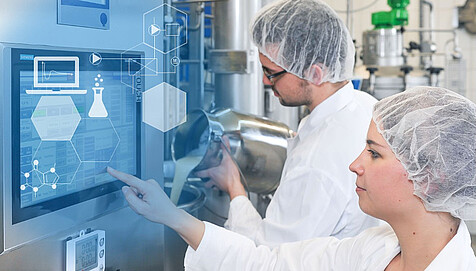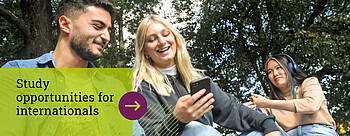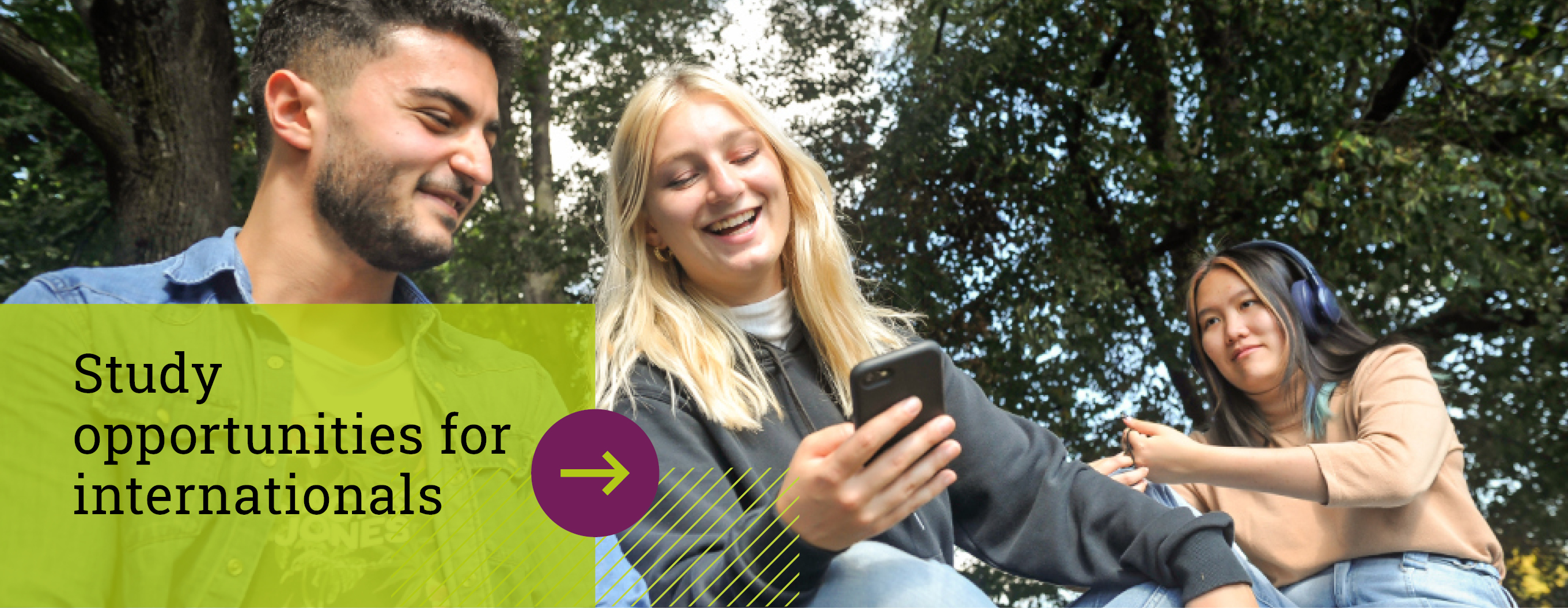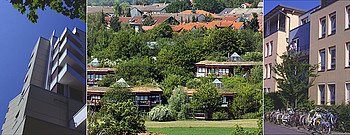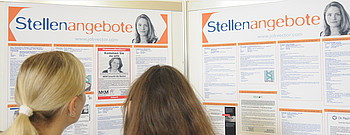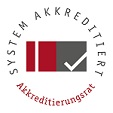Food Science and Technology (Master’s)
From traditional food to New Food
Food Science and Technology (Master’s)
From traditional food to New Food
Were you already enthusiastic about food technology and nutrition in your Bachelor’s degree? Then you can expand your knowledge in the MSc. Food Science and Technology you can expand and deepen your knowledge. New Food aims to provide a growing population with a healthier, more sustainable and more varied diet. We prepare our students to make production processes more sustainable, close cycles, and integrate alternative sources of raw materials into their diet. In the MSc. Food Science and Technology, you can deepen and advance your knowledge and ideas directly in excellently equipped laboratories with state-of-the-art technology and pilot plants. Are you ready to help shape the future of food supply? Then become part of an exciting culinary revolution.
- The No. 1 in Germany
- Modern Laboratories and pilot plants
- No tuition fees for foreign EU-students
(€ 1,500 per semester from outside EU) - Very good career prospects
- Reasons to Choose Hohenheim
| Degree Master of Science (M.Sc.) |
4 semesters 120 credits |
Language English |
University places 43 |
Location Stuttgart |
|||||
The semesters are divided into four block modules of four weeks each, giving you the opportunity to devote yourself intensively to a specific subject area for three weeks. In the three weeks, you will deepen the knowledge you have acquired in the lectures by way of parallel seminars and practical courses. The modules conclude with an examination on the Friday of the fourth lecture week. The block periods are organized uniformly in the Faculties of Agricultural Sciences and Natural Sciences, which allows you to design your schedule of modules in an interdisciplinary manner. The block periods largely coincide with the regular lecture period, so that you have no other obligations during the lecture-free period and can organize it as you wish.
You can find information about the individual modules in the module catalog.
In your first semester at
... you will brush up on and expand the scientific and technological basics in the compulsory modules tailored to them in order to develop an in-depth understanding of food processing.
At the same time, you will acquire scientific methodological skills. This includes state-of-the-art chemical, physical, and molecular methods, statistical procedures for data evaluation, techniques for modelling and simulating reactions and for the digital mapping of processes. You will apply the knowledge you have gained in internships. In seminars, you will deal with sustainable food production in a scientific, technological, and economic context.
In the second and third semesters
... you have the freedom to design your studies according to your individual interests, to take a broad approach, or to specialize. You will deepen your acquired knowledge and expand your practical skills in elective modules with an analytical, technical, and/or data science focus.
The monthly block modules give you the flexibility to complete a semester abroad or individual modules at one of our excellent partner universities or to work on a project in the research and development department of German and foreign companies. Project work at the Institute of Food Science and Biotechnology will introduce you to our current research projects. The best preparation for your Master’s thesis at the end of your studies.
In your Master’s thesis ...
, which you will write in one of our 11 departments, you will have the opportunity to work in a team on current, experimental research projects. This will enable you to contribute your acquired knowledge and ideas, expand your practical skills and abilities, and thus make your contribution to innovation and sustainability in food science.
You want to find out more?
For detailed information on the timescale and structure of your studies, you can find this on this page in the Downloads section.
Study objectives
As a “Hohenheim food scientist and biologist,” you will be able to:
- make production processes for traditional food and new food (more) sustainable (energy and water, side streams)
- take a holistic view of production processes
- select technologies and evaluate them, obtain recyclables from side streams, and close loops
- integrate alternative raw material sources into existing product groups and production processes
- efficiently extract functional compounds from plant and animal raw materials, modify them enzymatically and/or stabilize them by encapsulation
- accompany the product development cycle holistically, i.e. select and establish suitable analysis tools for quality requirements for the initial, intermediate, and end product, select the necessary process steps and equipment, manufacture initial prototypes, and finally implement the production process.
- On troubleshooting: If things don't work, systematically analyze the error and initiate corrective measures.
After your studies, you will be ready to shape the future of food supply! Where could you go from here?
- Collaboration in research groups at renowned national or international research institutions
- The world of life science is open to you in research and development, project management, quality assurance, or technical management in companies at home and abroad:
- Large, medium-sized, and small companies as well as start-ups in the life science sector and their suppliers
- Companies with a focus on alternative and functional ingredients
- Pharmaceutical industry,
- Health care and life science sector - Food machinery engineering with a focus on plant, process, and packaging technology
- Project planner for process plants
- Business consulting
- Data science companies
- Research groups at national or international universities or research institutions
- Research and development, project management, quality assurance, or technical management in the following industries:
- Food industry and its supplier industries
- Biotechnology industry
- Pharmaceutical industry
- Healthcare
- Plant, process, and packaging technology
- Private and public research institutions
- Journalism
- Business consulting
- Small degree program with excellent student-faculty ratio
- Links between research and teaching
- Modern labs with cutting-edge technology
- Technical test facilities with pilot plants for research and teaching offer the chance to develop and test new production processes
- Possibility to include modules in the related disciplines Biology and Nutritional Science

The Master’s program Food Science and Technology is embedded in the ongoing research projects at the Institute of Food Science and Biotechnology. Together with the Institute of Food Chemistry and the nutritional science institutes, our interdisciplinary expertise covers all aspects of food systems and their analysis.
Specializations of our scientific staff include, for example, food microbiology, food biotechnology, food analytics, food chemistry, and food sensors.
Research Focuses
There are two major research focuses in the area of food science, biotechnology, and food chemistry in Hohenheim:
The focus “safe and technological treatment of food systems” combines research activities on the links between food ingredients, microorganisms, and enzymes with the technological processes used to produce them. The experimental research in this area concentrates on the behavior of individual substances during production and the reactions of substances with and in the complex food matrix as well as food contact materials.
The second research focus “producing functional food substances” includes activities that look into the viability and safety of new substances and additives in food production. Our research in this area aims to increase the quality of food, but also to develop new and innovative food products that offer advantages to specific consumer groups.
Cooperation
So that we can continue to expand our successful, ongoing research projects and to create sustainable synergies, we collaborate intensively with our excellent partners:
- Technical University of Munich
- Karlsruhe Institute of Technology
- German Institute of Food Technologies (Osnabrück)
- Max-Rubner Institute
| Application deadlines | |
|---|---|
| 1st subject-related semester |
|
Higher subject-related semesters |
|
| Requirements | |
|---|---|
| Formal requirements |
|
| Language skills | English B2 |
| Pre-study internship | No |
| Selection procedure | |
|---|---|
| Selection criteria |
|
| Selection interview | No |
| Please take care of housing early on and in parallel with your application. You can find all further information on the Housing page. | |

